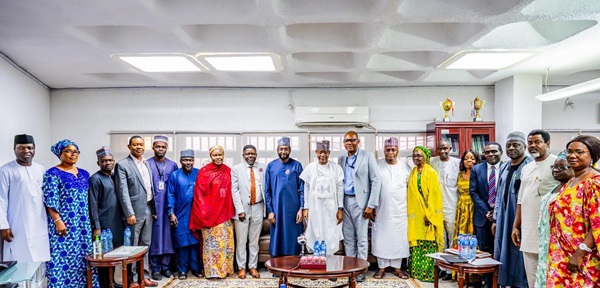
The National Information Technology Development Agency (NITDA) is collaborating with the National Universities Commission (NUC) to incorporate digital literacy as a core course in all Nigerian universities.
During a recent courtesy visit to the NUC headquarters in Abuja, NITDA’s director-general, Mallam Kashifu Abdullahi announced this initiative. He stated that the partnership builds on the success of the “Digital Literacy for All” initiative, previously implemented at Nasarawa State University, Keffi. This marks a significant step toward enhancing digital skills and preparing Nigeria’s youth for the digital economy.
Abdullahi emphasised the importance of equipping students with essential digital skills through formal education as a critical component in achieving Nigeria’s digital economy goals. He explained that NITDA’s Strategic Roadmap and Action Plan (SRAP 2.0) features eight pillars, with prioritising digital literacy and talent cultivation being paramount.
“Our goal is to achieve 70 per cent digital literacy by 2027 and 95 per cent by 2030. Making digital skills a general course in universities is a sustainable approach to reach this target,” he stated.
Building on the pilot program at Nasarawa State University, where digital literacy was introduced as a self-learning, credit-earning course with support from Cisco, NITDA aims to replicate this model across the nation.
“With the support of NUC, we can establish digital literacy as a standard requirement, much like English and Mathematics, empowering students to effectively navigate and contribute to the digital economy,” Abdullahi said.
He underscored the vital role of universities in realizing these goals, noting, “Universities are essential stakeholders, and research is the foundation of a robust economy. We must collaborate to create a technology research ecosystem that addresses national challenges.”
Abdullahi also highlighted the need to align education with industry demands, particularly through the Nigerian Start-Up Act, a legal framework aimed at nurturing entrepreneurial ecosystems. With guidance from NUC, universities can customise their programmes to equip students with in-demand skills, preparing them to be job creators rather than job seekers.
He reiterated the importance of collaboration, stating, “No one succeeds in isolation. This partnership with NUC is crucial for achieving our vision. Together, we can prepare our citizens for the future, bridge the digital divide, and position Nigeria as a global talent hub.”
Following Abdullahi’s remarks, the executive secretary of the NUC, Chris Maiyaki commended the initiative and reaffirmed the commission’s commitment to driving digital transformation in Nigeria’s university system.
He highlighted the urgency of integrating digital literacy into university curricula, stating, “The rapid pace of change in the digital revolution highlights the need for the Nigerian university system to engage in this transformation. Digital literacy is a critical resource; it is nearly impossible to function effectively today without significant technological skills.”
While acknowledging the challenges faced by Nigerian universities regarding digital infrastructure, Maiyaki expressed optimism about the partnership and reaffirmed his commitment to its successful implementation.
“We are very proud of this initiative. It holds enormous potential for our university system to engage with the rapidly expanding digital landscape. Utilising digital platforms to enhance our research ecosystem and exploring the possibilities of artificial intelligence are critical areas that can transform higher education,” he concluded.


